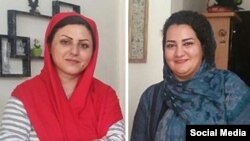Amnesty decries 'appalling treatment' of Iranian activists in prison
| Publisher | Radio Free Europe/Radio Liberty |
| Publication Date | 9 March 2018 |
| Cite as | Radio Free Europe/Radio Liberty, Amnesty decries 'appalling treatment' of Iranian activists in prison, 9 March 2018, available at: https://www.refworld.org/docid/5b20dd197.html [accessed 29 May 2023] |
| Disclaimer | This is not a UNHCR publication. UNHCR is not responsible for, nor does it necessarily endorse, its content. Any views expressed are solely those of the author or publisher and do not necessarily reflect those of UNHCR, the United Nations or its Member States. |
March 09, 2018 19:31 GMT
By RFE/RL
 Golrokh Iraee (left) and Atena Daemi
Golrokh Iraee (left) and Atena Daemi
Amnesty International says two Iranian human rights activists are enduring "appalling treatment" in a prison outside Tehran.
In a statement on March 9, Amnesty International said Atena Daemi and Golrokh Ebrahimi Iraee were being held in "unsanitary conditions" in the Shahr-e Rey prison, on the outskirts of Tehran, and their access to the outside world was being "severely restricted."
London-based Amnesty International called for the "women's immediate and unconditional release."
"We are extremely alarmed by reports from Shahr-e Rey prison about the targeting and escalating ill treatment of Golrokh and Atena," said Philip Luther, Amnesty International's research and advocacy director for the Middle East and North Africa.
"They should never have been imprisoned in the first place, and now it seems the Iranian authorities are deliberately subjecting them to cruel, inhuman, and degrading treatment because of their outspoken activism and continued human rights work, even behind bars," Luther added.
Iraee is serving a three-year sentence for writing an unpublished fictional story about the horrific practice of stoning.
Daemi is serving a sentence of seven years for distributing leaflets and writing posts on Facebook and Twitter that criticized Iran's use of the death penalty.
Link to original story on RFE/RL website
